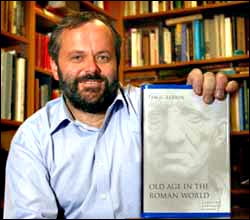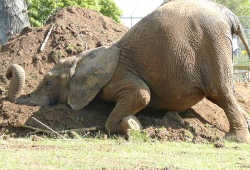A review of Professor Tim Parkin’s book Old Age in the Roman World Reprinted from the University of Canterbury’s Chronicle – 11/07/03
|
|
In researching his latest book, Professor Tim Parkin (Classics) discovered that older people might not always have enjoyed as respected or as powerful a place in ancient Roman society as had been supposed.
In Old Age in the Roman World, published by Johns Hopkins University Press, Professor Parkin considers the many issues related to aging and the aged in Roman times. He coaxes new insights from a variety of sources, including legal documents, representations of old age in classical literature, epitaphs, Greco-Roman medical texts, and papyri from Roman Egypt.
Analysing such diverse sources, he offers valuable new views of old age – not only of men in public life but also of men and women in marriage, sexual relationships, and the family.
He says classical authors such as Cicero and Plutarch (themselves writing later in life) would have us believe that the elderly were automatically the revered, active citizens of ancient Rome.
“Yet, when you investigate further you find older Romans of every generation complaining that they are not being treated like the elderly ‘back in the old days’, a comment which has a timeless ring to it .”
Performance of one’s duties was what mattered to the Romans, more than expecting respect simply because of one’s age. “If a person performed well in public office, for example, it didn’t particularly matter whether he was 40 or 70. So in that respect, Romans didn’t write someone off just because of their age.
“The elderly as a group were granted no privileged status or ongoing social roles. At the same time they were both permitted – and expected – to continue to participate actively in society for as long as they were able. After that point, they were expected to withdraw.”
In the minds of Roman citizens, it was vital to produce legitimate offspring, not only to maintain population supremacy over the slave and freed classes, but also to provide for themselves in old age.
If you could no longer be self-supporting in old age then you had to find someone to look after you.
“Normally that would be your children, or if you had none, or none were willing, possibly a slave or two,” Professor Parkin said.
“Such was the importance of procreation that inability to reproduce was one of the reasons a man could divorce his wife. Her (or indeed his) advanced age was another.” There was social and legal pressure to get married and have children while you were still young enough . . . bachelors were taxed.
The existence of the lonely elderly opened the way for “legacy hunters”, non-family members who befriended the old and wealthy and provided care and companionship in return for a roof over their heads and being “written into the will”.
Professor Parkin says there are also lessons in the Roman attitudes to old age: “They knew about eating well, exercising, and taking wine in moderation to encourage good health, physical and mental, into old age: mens sana in corpore sano. Nor did they use age of itself to discriminate against people being permitted to continue to make an active contribution.”
* Old Age in the Roman World: A Cultural and Social History, by Tim G Parkin. Johns Hopkins University Press, hardcover, 520 pp., 3 line drawings, 0-8018-7128-X, $US55.00

 Professor Tim Parkin has examined the issues of aging in his latest book, Old Age in the Roman World
Professor Tim Parkin has examined the issues of aging in his latest book, Old Age in the Roman World


